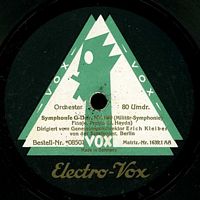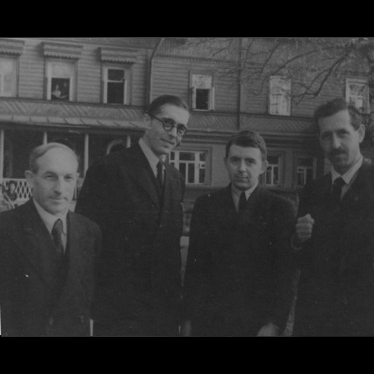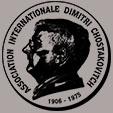Étiquette : Dimitri Mitropoulos
SONY Classical vient d’annoncer la parution prévue en avril 2022 d’un imposant coffret de 69 CD intitulé « Dimitri Mitropoulos – The Complete RCA and Columbia Album Collection ».
C’est un véritable événement , car l’accessibilité de nombre de ces documents historiques était devenu problématique.
Les détails de la composition du coffret sont donnés ici
______________
SONY Classical has just announced the publication in April 2022 of an important Boxset titled: « Dimitri Mitropoulos – The Complete RCA and Columbia Album Collection ».
This is a great event since many of these historical documents had become hard to find.
The details of its content are given here

Dimitri Mitropoulos Kölner Rundfunk Sinfonie Orchester
Lucretia West, mezzo-soprano
Kölner Rundfunkchor dir: Bernhard Zimmermann
Kölner Domchor dir: Adolf Wendel
Köln Funkhaus Saal 1 – 31 Oktober 1960
Source: Bande/Tape 38 cm/s / 15 ips
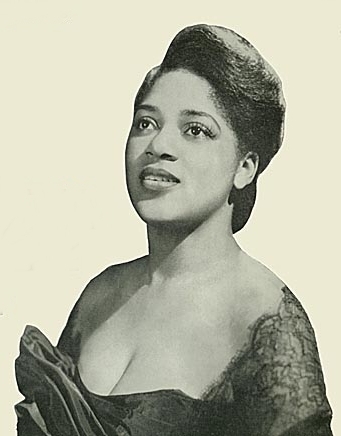
Lucretia West
Ce fut donc le dernier concert de Dimitri Mitropoulos, qui en dépit de son état de santé, s’était imposé pendant l’été et l’automne 1960 une programmation très chargée, qui est reconstituée ici pour la première fois.
Au Festival de Salzburg 1960, il donne deux concerts triomphaux (Mendelssohn Symphonie n°3, Schoenberg Variations Op.31 et Debussy La Mer le 21 août, et la Symphonie n°8 de Mahler le 28 août). Ensuite, Il dirige au Wiener Staatsoper six représentations (23, 27 et 30 septembre; 7, 12 et 15 octobre) de la Forza del Destino de Verdi qualifiées de géniales par la presse autrichienne, entrecoupées avec les Wiener Philharmoniker de deux programmes à la Musikvereinsaal, d’une part les 1 et 2 octobre (Mahler Symphonie n°9), et d’autre part les 8 et 9 octobre (Schumann Symphonie n°2, Th. Berger Jahreszeiten et Debussy La Mer). Ces deux programmes sont redonnés au cours d’une courte tournée, le 10 à Graz pour le premier, et le 11 à Linz pour le deuxième.
Il se rend ensuite à Cologne pour une série de quatre concerts avec l’Orchestre Symphonique de la WDR (Kölner Rundfunk Sinfonie Orchester).
Le premier de ceux-ci, le 24 octobre, reprend le programme salzbourgeois du 21 août avec le BPO, et le second, le 31 octobre, est donc consacré à cette Troisième de Mahler. Lors du concert du 31, il réussit à surmonter un malaise au cours du premier mouvement, mais il refuse cependant les avis pressants d’interrompre le concert après l’entracte qui suit le premier mouvement, acceptant seulement de diriger assis. En dépit de son état de fatigue extrême, il prend immédiatement après la fin du concert le train de nuit pour Milan où il doit diriger cette même Troisième le 7 novembre avec l’Orchestre de la Scala.
Le soir du 1er novembre, il rédige dans sa chambre d’hôtel milanaise une courte lettre à l’intention de l’épouse de Bruno Zirato*, Nina, qu’il poste le lendemain matin en se rendant à sa répétition avec l’Orchestre de la Scala: « Je suis ici à Milan, malheureux et mort de fatigue, et je m’inquiète de mon état de santé. Le climat de Cologne ne m’a pas fait de bien…. J’étais toujours à court de respiration. Chers amis, priez pour que je puisse retourner à New-York, et qu’ici je ne sois pas obligé d’aller à l’hôpital. Votre malheureux Dimitri ».
Le décès de Mitropoulos au cours de la répétition du 2 novembre a été rapporté dans l’ouvrage de Willam R. Trotter « Priest of Music The Life of Dimitri Mitropoulos« .
Karl O. Hoch (WDR – Leiter der Hauptabteilung Musik) annonce dans son hommage radiophonique que le chef venait d’accepter sa nomination comme Directeur Musical du Kölner Rundfunk Sinfonie Orchester. On ne connaît pas les programmes des deux autres concerts prévus à Cologne les 14 et 21 novembre.
Mitropoulos avait également des engagements à New-York avec le New-York Philharmonic et le Metropolitan Opera**. Il s’agissait tout d’abord d’un prestigieux concert supplémentaire qui avait été décidé probablement début octobre et pour lequel un accord avait été finalisé le 18 octobre: le « Pension Fund Concert » du 18 décembre avec une rencontre qui promettait d’être exceptionnelle avec le pianiste Sviatoslav Richter (Beethoven Concerto n°1 et Brahms Concerto n°2). Deux répétitions avaient été prévues le 14 et le 17 en tenant compte des engagements que Mitropoulos avait avec le Metropolitan Opera.
Le 28 octobre, le concert a été mis en location par correspondance. L’administration a été submergée par les demandes de billets, et plus de 2000 chèques ont dû être retournés aux souscripteurs. Le concert a finalement été dirigé par Bernstein et Richter a joué Liszt (Concerto n°2) et Tchaïkovski (Concerto n°1).
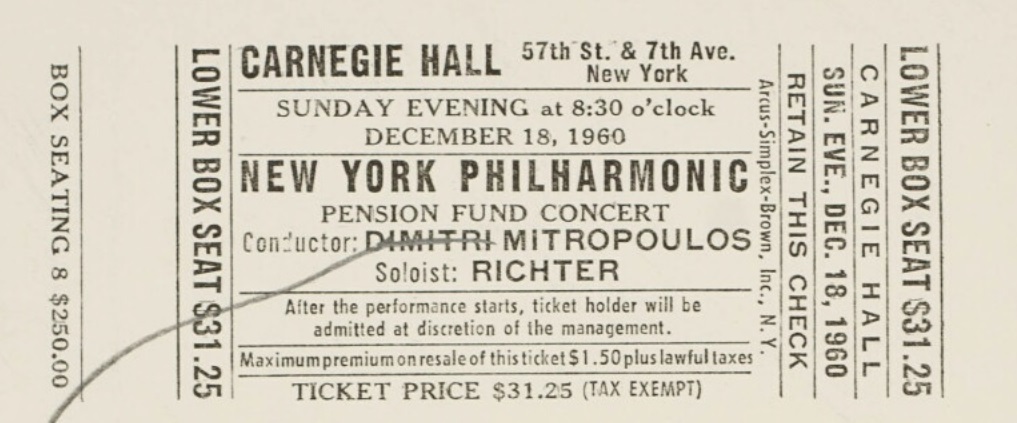
Pour la saison 1960-1961, Dimitri Mitropoulos avait des engagements pour quatre semaines de concerts successives avec le NYPO:
I – 29 et 30 décembre 1960 1er janvier 1961: Mahler Symphonie n°3 avec Martha Lipton. Le chef de chœur Hugh Ross propose de faire répéter ensemble un chœur féminin (27) du Berkshire Music Center (plutôt que la Schola Cantorum de New-York) et un chœur d’enfants (25) de la High School of Music and Art.
II – 5, 6 ,7 et 8 janvier 1961: Bach-Schoenberg Prélude et Fugue en mi mineur; Katchaturian Concerto pour violoncelle avec Rohan de Saram; Scriabine Prométhée (Poème du Feu) Op.60.
III – 12, 13, 14 et 15 janvier 1961: Mendelssohn Symphonie n°3; Krenek Medea avec Blanche Thebom; Gould Dialogues pour piano et orchestre à cordes avec Morton Gould; Skalkottas Danses Grecques.
IV – 19, 20, 21 et 22 janvier 1961: Beethoven Symphonie n°2; Berg 3 Pièces pour orchestre Op.6; Prokofiev Concerto pour piano n°3 Zadel Skolovsky; Berlioz Rob Roy, Ouverture.
Ces concerts, reprogrammés dans l’urgence, ont été assurés avec des programmes presque entièrement différents, par Stanislav Skrowaczewski pour les deux premiers et Paul Paray pour les deux suivants.
La Troisième de Mahler a été donnée plus tard, les 30 et 31 mars, et les 1 et 2 avril 1961 sous la direction de Leonard Bernstein, à la mémoire de Dimitri Mitropoulos.
Trois ans après son départ de la direction du NYPO, l’attitude de l »administration de l’orchestre à son égard avait changé. Les succès rencontrés au Met ainsi qu’en Europe (Festival de Salzburg, Wiener Staatsoper, WDR Köln) y ont vraisemblablement été pour beaucoup. Un autre indice de ce relatif rapprochement se trouve dans le fait que, pour ses concerts de l’été et de l’automne 1960, Mitropoulos avait emprunté au NYPO la partition orchestrale et le matériel d’orchestre de « La Mer » de Debussy. Après son décès, eut lieu un échange de courrier inquiet entre Joan Bonime (NYPO) et Karl O. Hoch (WDR) pour récupérer ces précieux documents, ce qui eut lieu effectivement dans les semaines qui suivirent. A noter que Mitropoulos, qui dirigeait par cœur, avait laissé la partition dans son appartement de New-York, et n’avait emmené en Europe que le matériel d’orchestre!
Les enregistrements radiophoniques qui nous restent de cette période (les deux concerts de Salzburg, la représentation de la Forza del Destino du 23 septembre au Wiener Staatsoper, la Neuvième de Mahler avec le WPO le 2 octobre et les deux concerts avec l’Orchestre de la WDR Köln avec la magnifique prestation de Lucretia West dans Mahler) sont d’inestimables documents.
* Bruno Zirato était jusqu’en 1959 l’Administrateur Général du New-York Philharmonic. Cette lettre a été publiée dans un article commémoratif signé par Bruno Zirato, inclus dans le programme du Metropolitan Opera du 5 décembre 1960. Mitropoulos avait des engagements au « Met » pour le mois de décembre, mais aucune documentation n’est disponible à ce sujet.
** Le 2 novembre, avant la représentation de Boris Godounov au « Met », l’orchestre joue sans chef la Danse des Esprits Heureux de l’ « Orfeo ed Euridice » de Gluck et Rudolf Bing s’adresse au public en ces termes: « Une autre grande tragédie a frappé le Metropolitan Opera et en fait le monde musical. Notre bien-aimé Dimitri Mitropoulos est décédé ce matin à Milan. Vous l’aimiez tous et vous savez qu’il était un des grands musiciens et un des grands chef d’orchestre de notre temps, ainsi qu’un extraordinaire être humain. Sa perte est personnellement ressentie par chacun au Metropolitan – en fait tous les membres de cet orchestre étaient ses amis. Bien sûr le Metropolitan Opera va continuer et d’autres grands chefs pourraient aller et venir, mais il y aura toujours dans nos cœurs une place spéciale pour Dimitri Mitropoulos «
__________________
This was Dimitri Mitropoulos’ last concert. In spite of his health condition, he drove himself hard during the summer and the autumn of 1960 with a heavy schedule, reconstructed here for the first time.
At the 1960 Salzburg Festival, he gives two triumphal concerts (Mendelssohn Symphony n°3, Schoenberg Variations Op.31 and Debussy La Mer on August 21, and Mahler Symphony n°8 on August 28). Then, he conducts at the Wiener Staatsoper six performances (September 23, 27 and 30 and October 7, 12 and 15) of Verdi’s « La Forza del Destino » de Verdi considered by the Austrian press as a stroke of genius, interleaved with two programs at the Musikvereinsaal with the Wiener Philharmoniker on the one hand on October 1 and 2 (Mahler Symphony n°9), and on the other hand on October 8 and 9 (Schumann Symphony n°2, Th. Berger Jahreszeiten and Debussy La Mer). These two programs are performed again during a short tour on October 10 in Graz for the first one, and on October 11 in Linz for the second.
Thereafter, he travels to Cologne for a series of four concerts with the WDR Sinfonie Orchester (Kölner Rundfunk Sinfonie Orchester).
The first of them, on October 24, has the same program as the BPO August 21 Salzburg concert, and the second, on October 31, is then dedicated to the Mahler’s Third. During the October 31 concert, he succeeds in overcoming a stroke during the first movement, but however refuses the urging advices against resuming the concert after the intermission following the first movament, only accepting to conduct seated. After the end of the performance, in spite of his high state of exhaustion, he takes the night train to Milan where he is to conduct that same Third Symphony with La Scala Orchestra on November 7.
On the evening of November 1st, he writes in his Milan hotel room a short letter to Bruno Zirato’s wife*, Nina, which he mails the next morning while going to his rehearsal with the Scala Orchestra: « Here I am in Milano. I am miserable, dead tired, and I am worried over the state of my health. The climate in Cologne did me no good…. I was always short of breath. Dear friends, please pray that I will be able to return to New York, and not be forced to enter a hospital here. Your unhappy Dimitri ».
Mitropoulos’ death during the November 2 rehearsal has been told in Willam R. Trotter’s book « Priest of Music The Life of Dimitri Mitropoulos« .
Karl O. Hoch (WDR – Leiter der Hauptabteilung Musik) announces in his broadcast tribute that the conducter has accepted to become Music Director of the Kölner Rundfunk Sinfonie Orchester. The programs of the other two Cologne concerts on November 14 and 21 are not known.
Mitropoulos was also to perform in New-York with the New-York Philharmonic and the Metropolitan Opera**. Firstly, it was a prestigious supplementary concert that was probably decided at the beginning of October and for which an agreement was finalized on October 18: the December 18 « Pension Fund Concert » with an exceptionally promising meeting with pianist Sviatoslav Richter (Beethoven Concerto n°1 and Brahms Concerto n°2). Two rehearsals were set on December 14 and 17 to take care of Mitropoulos’ schedule with the Metropolitan Opera.
On October 28, a mail order was launched. The administration was overflooded with orders for tickets and more than 2,000 cheques had to be returned to subscribers. The rescheduled concert was conducted by Bernstein and Richter played Liszt (Concerto n°2) and Tchaïkovski (Concerto n°1).

For the 1960-1961 season, Dimitri Mitropoulos was to perform during four successive weeks with the NYPO:
I – December 29 and 30, 1960 and January 1st, 1961: Mahler Symphony n°3 with Martha Lipton. Choir director Hugh Ross suggested to make joint rehearsals with a women choir (27) from the Berkshire Music Center (rather than from the Schola Cantorum of New York) and a children choir (25) of the High School of Music and Art.
II – January 5, 6 ,7 and 8, 1961: Bach-Schoenberg Prelude and Fugue in E flat; Katchaturian Cello Concerto with Rohan de Saram; Scriabin Prometheus (Poem of Fire) Op.60.
III – January 12, 13, 14 and 15, 1961: Mendelssohn Symphony n°3; Krenek Medea with Blanche Thebom; Gould Dialogues for piano and string orchestra with Morton Gould; Skalkottas Greek Dances.
IV – January 19, 20, 21 and 22, 1961: Beethoven Symphony n°2; Berg 3 Orchestra Pieces Op.6; Prokofiev Piano Concerto n°3 Zadel Skolovsky; Berlioz Rob Roy, Overture.
These concerts, hastily rescheduled, were given with almost entirely different programs by Stanislav Skrowaczewski for the first two and Paul Paray for the next two.
The Mahler Third was performed later on March 30 and 31 and on April 1 and 2, 1961 under the direction of Leonard Bernstein, in Memory of Dimitri Mitropoulos.
Three year after he left the NYPO as its Music director, the administration of the orchestra saw him differently. His success at the Met as well as in Europe (Salzburg Festival, Wiener Staatsoper, WDR Köln) were most certainly very instrumental. Another sign of this better relationship may be found in the fact that, for his 1960 summer and autumn concerts, Mitropoulos borrowed to the NYPO the orchestral score and the orchestral parts of « La Mer » by Debussy. After his death, an anxious exchange of letters took place between Joan Bonime (NYPO) and Karl O. Hoch (WDR) to get back these precious documents, which successfully happened during the next weeks. It is worth noting that Mitropoulos, who conducted by heart, left the orchestral score in his New York flat, and only brought with him to Europe the orchestral parts!
The broadcast recordings that have survived from that period (both Salzburg concerts, the Wiener Staatsoper performance of La Forza del Destino on September 23, the Mahler Ninth with the WPO on October 2 and both WDR Köln concerts, including Lucretia West beautifully singing Mahler) are as many historical documents.
* Bruno Zirato was until 1959 the General Manager of the New-York Philharmonic. This letter was published as part of a tribute signed by Bruno Zirato, in the December 5, 1960 program of the Metropolitan Opera. Mitropoulos was to conduct at the « Met » during the month of December, but it is not documented.
** On November 2, before the performance of Boris Godounov at the « Met », the orchestra plays without a conductor the Dance of the Blessed Spirits from « Orfeo ed Euridice » by Gluck and Rudolf Bing talks to the public with these words: « Another great tragedy has befallen the Metropolitan Opera and indeed the musical world. Our beloved Dimitri Mitropoulos died this morning in Milan. You all loved him, and you know he was one of the great musicians and great conductors of our time, and also an outstanding human being. His loss is felt personally by everyone at the Metropolitan – indeed all the members of this orchestra were his friends. Naturally the Metropolitan Opera will go on and other great conductors may come and go, but there will always be a very special place in our hearts for Dimitri Mitropoulos.«
Les liens de téléchargement sont dans le premier commentaire. The download links are in the first comment.
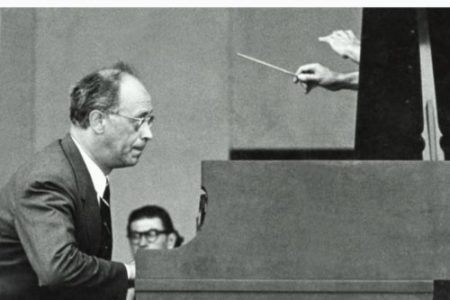
Rudolf Serkin – Dimitri Mitropoulos NYPO
Carnegie Hall – October 23, 1955
Source: Bande/Tape 19 cm/s / 7.5 ips
Pour les concerts de gala (avec de nombreux invités) fêtant la rentrée de l’orchestre après une longue tournée européenne (3 septembre – 7 octobre 1955), Rudolf Serkin et Dimitri Mitropoulos ont joué les 20 & 21 octobre 1955 trois Concertos de Mozart, successivement le n°25 K.503, le n°16 K.451 donné pour la première fois avec le NYPO, et le n°23 K.488. Les critiques ont été éminemment favorables, mais plusieurs ont remarqué que, si, quand le pianiste jouait, l’orchestre était réduit à de justes proportions mozartiennes, par contre, l’orchestre seul jouait avec le plein effectif de cordes, engendrant dans les tutti lourdeurs, problèmes d’équilibre et excès de dynamique.

Le plein effectif des cordes avec ses neuf contrebasses! (P-H Lang N-Y Herald Tribune Oct.21,1955)
Des critiques ont souligné que, pour un tel concert d’ouverture, le chef n’aurait pas pu faire autrement qu’employer ce plein effectif.
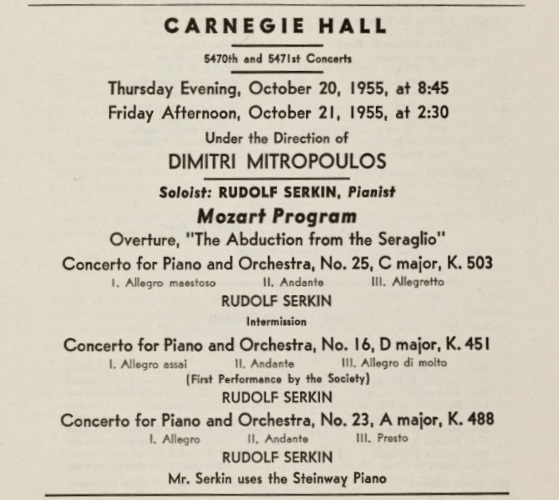
Le programme du concert radiodiffusé du dimanche 23 ne retenait que les Concertos n°16 & 25, mais s’ouvrait par la Sinfonia Concertante « K. Anh.104 » de Mozart:
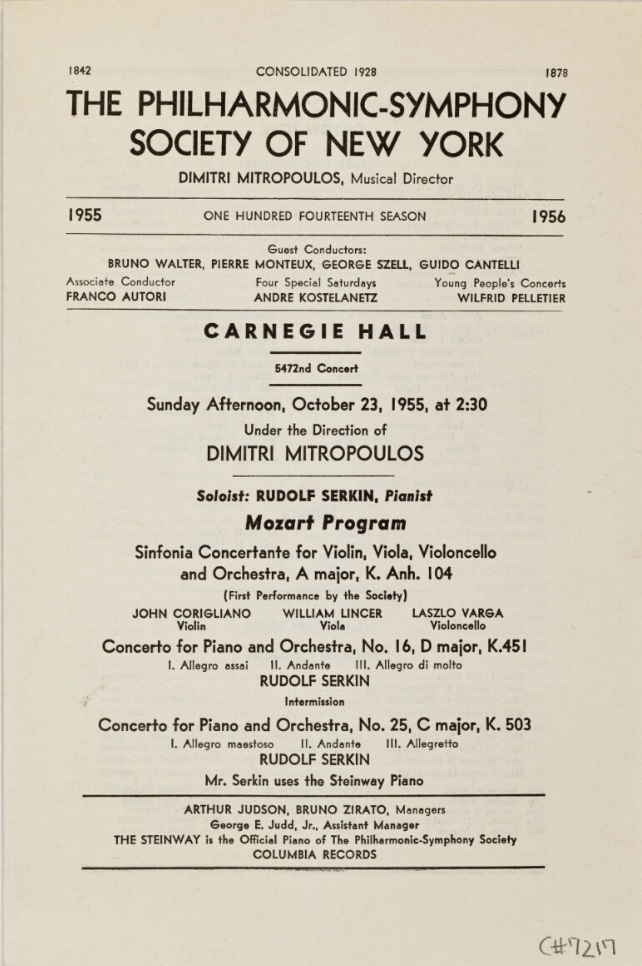
Sunday Afternoon Broadcast with only two Concertos played by Rudolf Serkin
For the gala opening concerts (with many guests) to celebrate the orchestra after its long European tour (September 3 – October 7, 1955), Rudolf Serkin and Dimitri Mitropoulos performed three Concertos by Mozart on October 1955, 20 & 21, successively n°25 K.503, n°16 K.451 (first performance with the NYPO), and n°23 K.488. The critics were quite favourable, but several of them remarked that, if in solo passages, the orchestra had the size of a Mozart ensemble, however the orchestra alone performed with a full complement of strings, thus with problems of heaviness, balance shifts and excessive dynamics in tutti. Critics underlined that, for such an opening concert, the conductor could not do otherwise than to display the full body of strings. Of these, only Concertos n°16 K.451 and n°25 K.503 were played at the Sunday Afternoon Broadcast concert, which opened with Mozart’s Sinfonia Concertante « K. Anh.104 ».
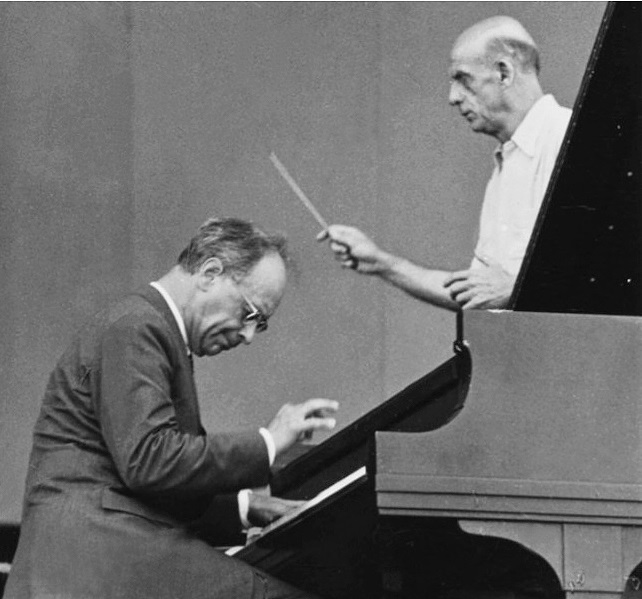
Les liens de téléchargement sont dans le premier commentaire. The download links are in the first comment.
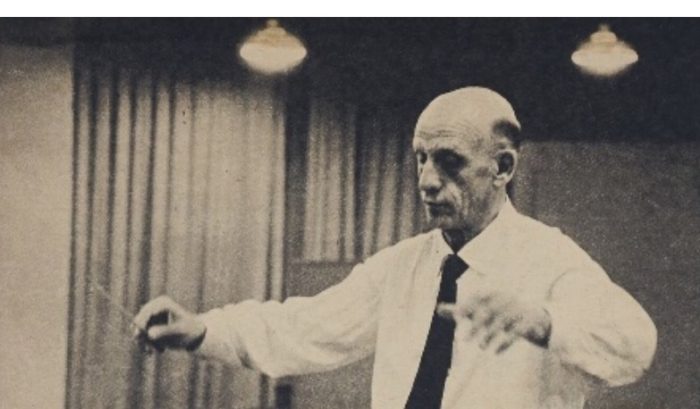
Dimitri Mitropoulos New York Philharmonic
Columbia 30th Street Studios – 24 février 1957
Bande 19 cm/s 2 pistes (7.5 ips ; 2 tracks) OMB – 6
Nous poursuivons cet Hommage à Dimitri Mitropoulos (1896-1960) à l’occasion du 125ème anniversaire de sa naissance. D’ici la fin de l’année, quatre autres publications vont suivre.
Février 1957, c’était pour Columbia le début de la stéréo. Le 18 février Bruno Walter commença à Carnegie Hall l’enregistrement de la Deuxième Symphonie de Mahler qu’il ne pourra terminer que l’année suivante. Pour cette Symphonie Fantastique, nous sommes dans les Studios Columbia de la 30ème rue, une ancienne église arménienne, qui a été utilisée depuis fin 1948 pour un très grand nombre d’enregistrements de musique de chambre et d’orchestre. La prise de son stéréophonique, très soignée, assume une esthétique sonore qui vise au spectaculaire, ce qui fonctionne parfaitement avec cette œuvre. L’interprétation, comme toujours très personnelle, de Mitropoulos est une réussite. Notons que le chef l’avait donnée au concert à Carnegie Hall les jeudi 21 et vendredi 22 février, et l’enregistrement a été réalisé le dimanche 24.
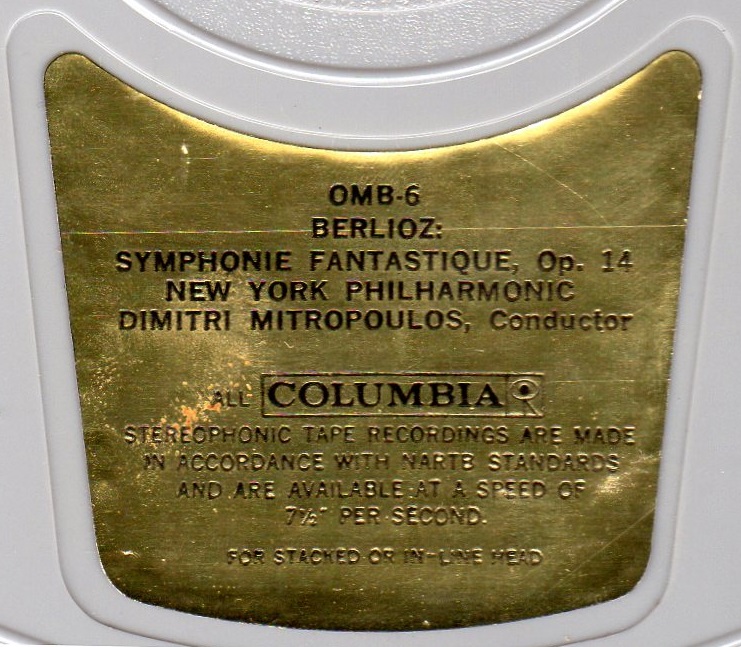
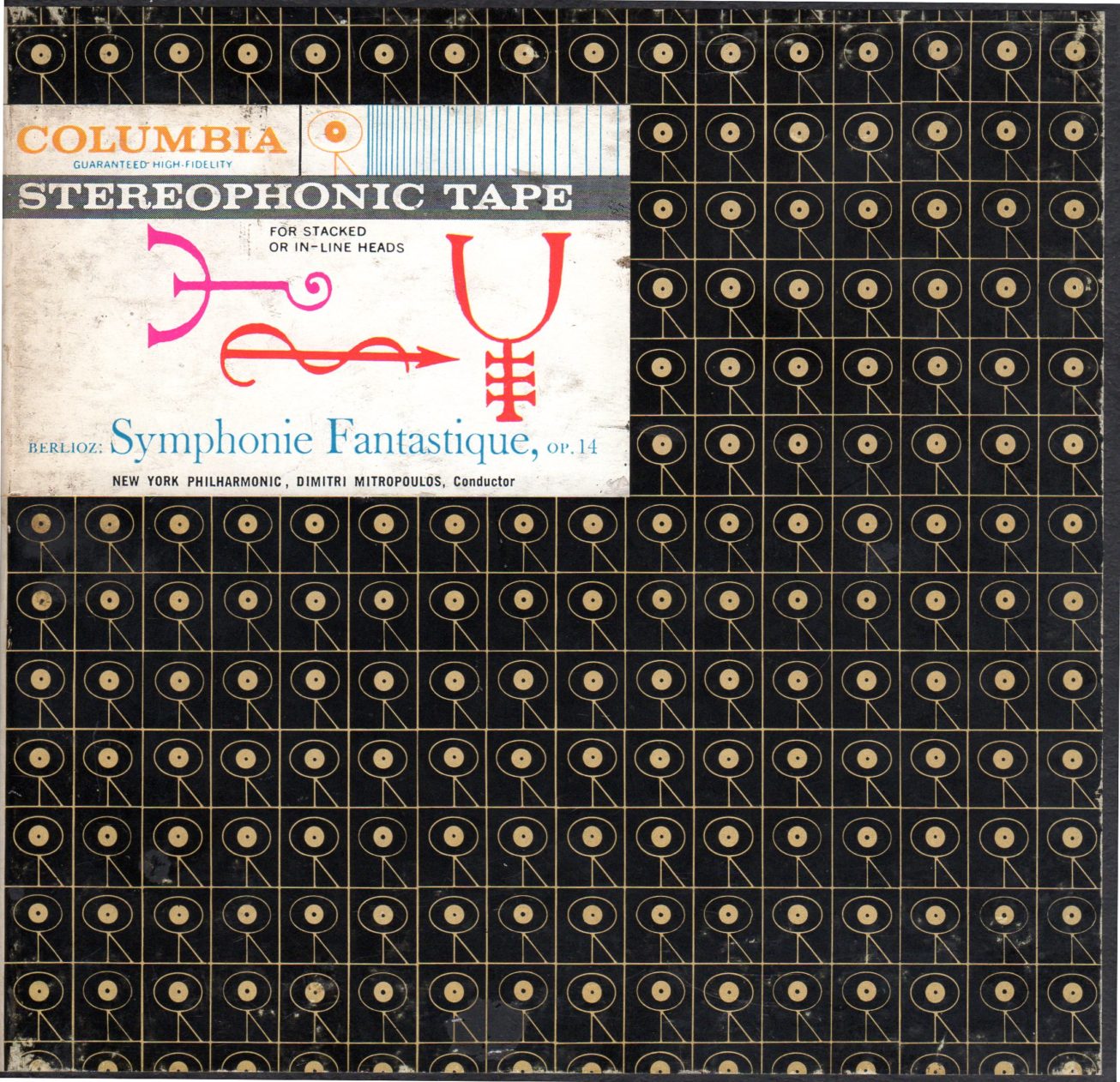
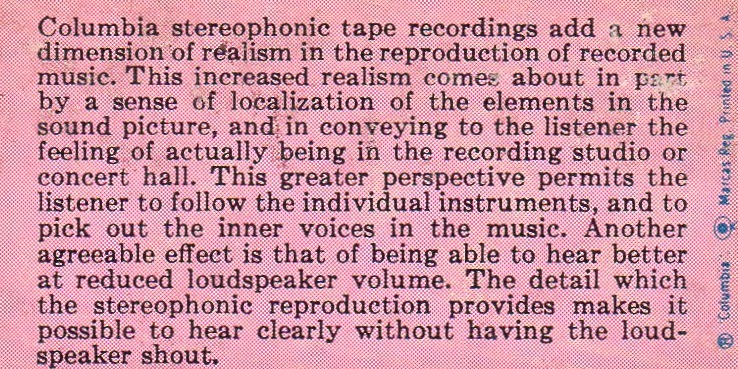
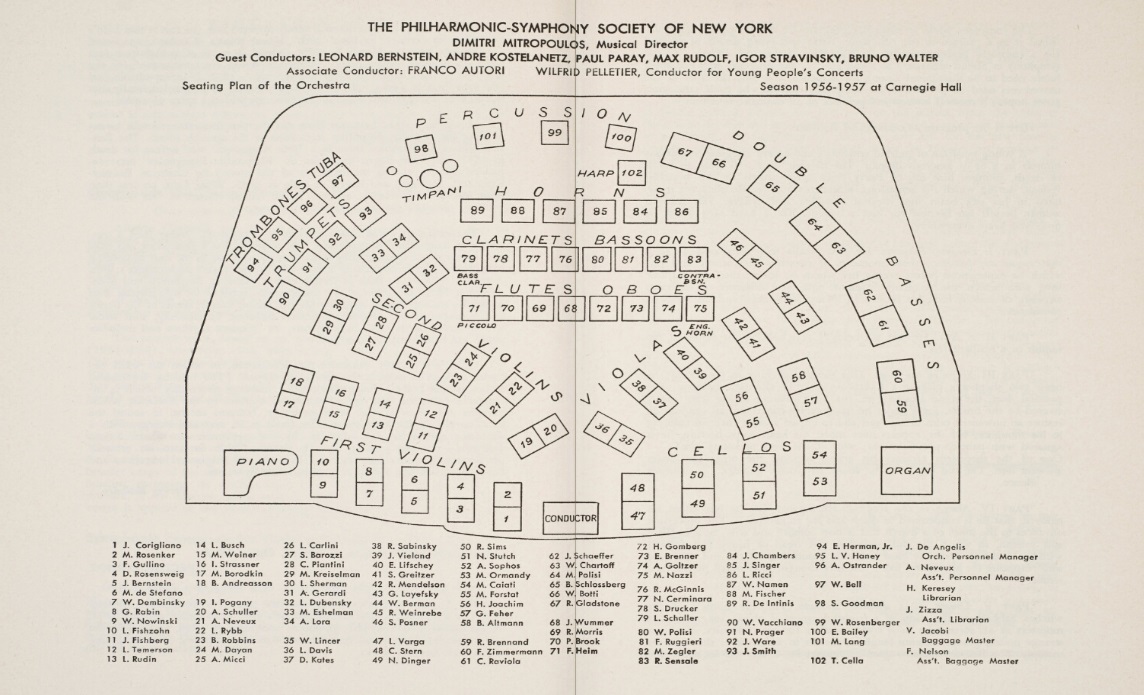
Disposition de l’orchestre à Carnegie Hall (saison 1956-1957)
We go on with this Tribute to Dimitri Mitropoulos (1896-1960) for the 125th Anniversary of his birth. Until the end of this year, four more posts will follow.
February 1957 was for Columbia the beginning of Stereo. On February 18, Bruno Walter began in Carnegie Hall the recording of Mahler’s Second Symphony which he was able to complete only the following year. For this Symphonie Fantastique, we are in the Columbia 30th Street Studios, a former Armenian church, which was used since the end of 1948 for a very large number of chamber music and orchestral recordings. The stereophonic recording, very carefully done, displays a chosen sound spectacular aesthetics, which matches this work perfectly well. The performance, very personnal, as always with Mitropoulos, is a winner. Note that the conductor performed it at Carnegie Hall on Thursday 21 and Friday 22, and the recording was made on Sunday, the 24th.
Les liens de téléchargement sont dans le premier commentaire. The download links are in the first comment.
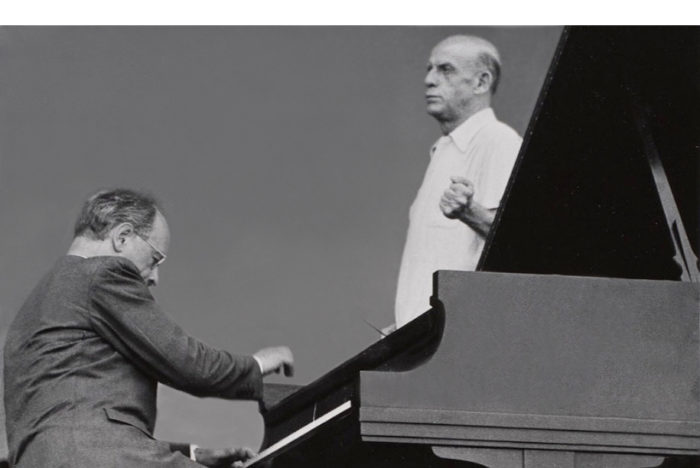
Rudolf Serkin – Dimitri Mitropoulos NYPO
Carnegie Hall – 31 octobre 1948 – Violoncelle solo: Leonard Rose
Source: Bande/Tape 38 cm/s / 15 ips
Entre le Concert du 20 février 1936 (Beethoven Concerto n°4 Op.58 & Mozart Concerto n°27 K.595 avec Arturo Toscanini) et le « Rudolf Serkin Golden Jubilee Program » du 20 février 1986 (Beethoven Concerto n°4 Op.58 avec Zubin Mehta), Rudolf Serkin a joué plus de 110 fois avec le NYPO, dont 27 Concerts sous la direction de Dimitri Mitropoulos, mais aucun disque avec ce dernier n’en est résulté. Ce rare enregistrement du Concerto n°2 de Brahms représente leur première collaboration avec le NYPO. L’interprétation est d’une rare intensité et il est donc tentant de la comparer avec la célèbre version Edwin Fischer/Wilhelm Furtwängler dont le style est bien sûr très différent.
(Enregistré sur disques 33 tours 40 cm à gravure directe, reportés ensuite sur bande magnétique).
_________________
New York Philharmonic – Concerts avec/with Rudolf Serkin & Dimitri Mitropoulos
(Carnegie Hall sauf indication contraire / Carnegie Hall unless otherwise indicated)
– Oct. 28, 29 & 31, 1948 Brahms Concerto n°2 Op.83
– Jan. 5, 6, 1950 Reger Concerto Op.114
– Jan. 7, 8,1950 Beethoven Concerto n°4 Op.58
– Nov. 13, 1950 Mozart Rondo K.382; Schumann Introduction & Allegro Op.134 (US Premiere), Mendelssohn Concerto n°1 Op.25; Strauss Burleske.
– Sept. 1, 1951(Edinburgh Usher Hall) Schumann Concerto Op.54
– Nov. 22, 23 & 25, 1951 Brahms Concerto n°1 Op.15
– Jan. 28 & 29, 1954 Mozart Concerto n°17 K.453; Strauss Burleske; Beethoven Concerto n°4 Op.58
– Febr. 17, 18 & 20, 1955 Brahms Concerto n°2 Op.83
– June 20, 1955 (Lewisohn Stadium – Manhattan) Beethoven Concerto n°5 Op.73
– Oct 20, 21, 1955 Mozart Concerto n°25 K.503, n°16 K.451 & n°23 K.488
– Oct 23, 1955 Mozart Concerto n°16 K.451 & n°25 K.503
– Febr. 28, March 1, 1957 Beethoven Concerto n°4 Op.58
– Febr. 6, 7 & 9, 1958 Schumann Introduction & Allegro Op.134; Strauss Burleske
– Febr. 8, 1958 Reger Concerto Op.114
(Une date soulignée indique un concert radiodiffusé/ an underlined date indicates a broadcast concert)
_________________
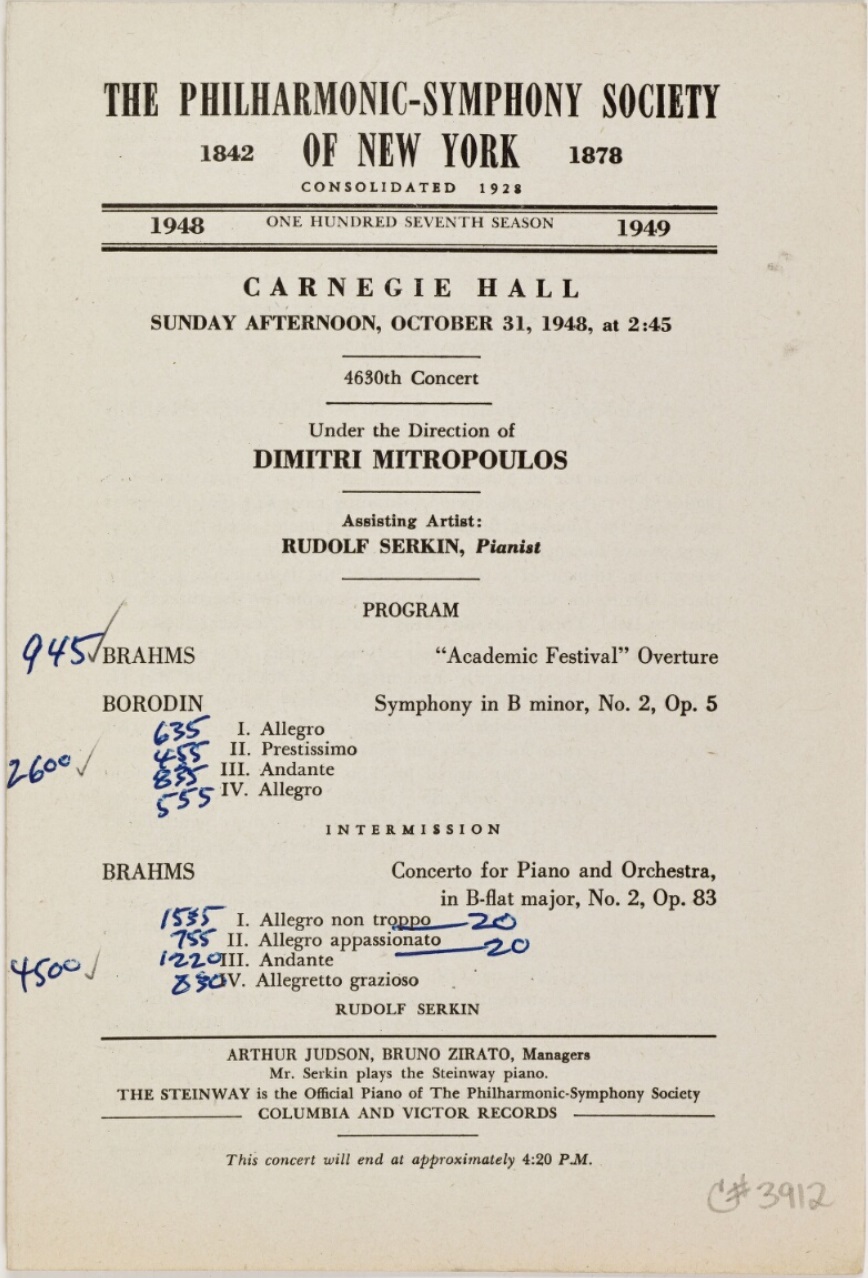
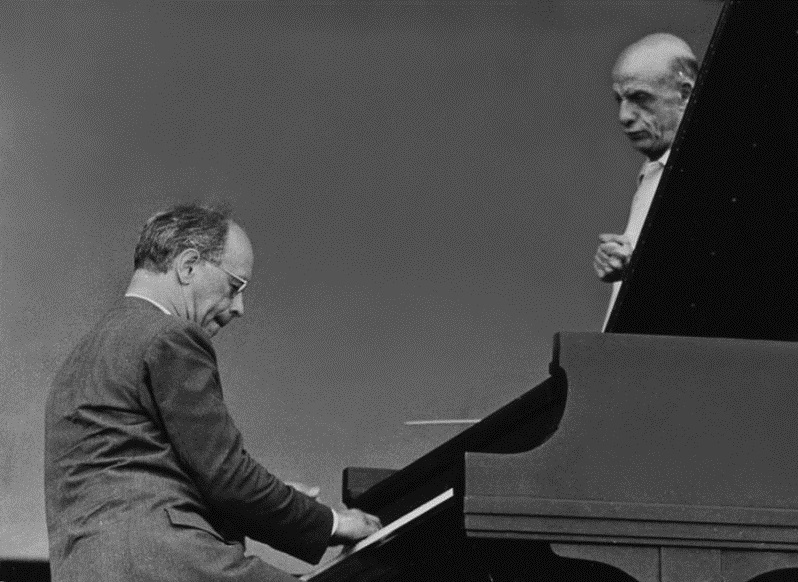
_________________
Between the Concert of February 20, 1936 (Beethoven Concerto n°4 Op.58 & Mozart Concerto n°27 K.595 with Arturo Toscanini) and the « Rudolf Serkin Golden Jubilee Program » of February 20, 1986 (Beethoven Concerto n°4 Op.58 with Zubin Mehta), Rudolf Serkin performed more than 110 times with the NYPO, including 27 Concerts (listed above) under the direction of Dimitri Mitropoulos, but no commercial recording with the latter ever materialized. This rare recording of Brahms’ Second Concerto n°2 (solo cellist: Leonard Rose) represents their first collaboration with the NYPO. The performance has a rare intensity, and for that matter, it is tempting to compare it with the well-known version with Edwin Fischer and Wilhelm Furtwängler, who of course play in a very different style.
(Recorded on 33rpm 16″ Transcription Discs later dubbed on magnetic tape).
_________________
Les liens de téléchargement sont dans le premier commentaire. The download links are in the first comment.

